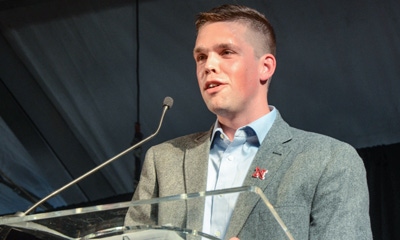
It's an unfortunate fact: Whether it's a friend or a family member, cancer is something that affects everyone. That's one of the reasons the Cattlemen's Ball of Nebraska unites more than 600 volunteers together each year to plan and prepare for the event, the main purpose of which is to raise money to fund cancer research.
Related: Funding a cure: Community unites for common cause
At this year's event in early June, several people affected by cancer gave testimonials on their experience, and the impact the event has had on cancer research.

CRITICAL ROLE: Kris Bousquet gave a testimonial during the Cattlemen's Ball Trail Boss Reception the evening of June 3. Bousquet has seen the benefits of the Cattlemen's Ball of Nebraska firsthand. During his senior year at UNL in 2015, he was diagnosed with leukemia. Fortunately, after treatments through UNMC, Bousquet is in complete remission and continues serving in the Air National Guard.
The funds raised by the Cattlemen's Ball of Nebraska have played a critical role in cancer research — the ball has raised more than $13 million over the last 18 years. Ninety percent of the funds raised at this event goes toward the Fred and Pamela Buffett Cancer Center at the University of Nebraska Medical Center in Omaha, and 10% goes toward local efforts.
It's something Kris Bousquet has seen the benefits of firsthand. During his senior year at the University of Nebraska-Lincoln in 2015, he was diagnosed with leukemia. Bousquet, a 26-year-old technical sergeant in the Air National Guard, grew up on a diversified dairy farm near South Sioux City, and planned to return to the farm and eventually become a commissioned officer and pilot. "Once I was diagnosed, that was all put on hold," he says. "I had a month toward the end of my college career where I wondered what was next."
Fortunately, after treatments through UNMC, Bousquet is in complete remission and continues serving in the Air National Guard. In July, he begins working for Dairy Farmers of America as a field representative for the eastern Nebraska-western Iowa region.
Shortly after his diagnosis, Bousquet was asked to serve on the Cattlemen's Ball hospitality committee. "My life was touched with leukemia, and I felt compelled to help out," he says. "It gives me the opportunity to see how people are touched by cancer, and how people are surviving because of the research at UNMC and the role the Cattlemen's Ball plays."
Beau Mathewson, 34, who operates a ranch near Potter, was diagnosed with a rare form of cancer in 2010. However, his family's ranch has a history of persevering through hard times — using management-intensive grazing practices to make the most of the grazing resources available in drought. When he was diagnosed, it was an easy decision to go from a cow-calf to a stocker and custom grazing operation, helping to use grazing resources more efficiently and making it easier to schedule trips to Houston, Texas, for treatments.
Although the diagnosis has impacted life on the ranch, Mathewson says it has given him a newfound appreciation for life. "Before you have cancer, you think you're going to live to be 90, and then you realize how fragile life is," he says. "You realize everybody has their own set of circumstances, and you realize how strong the human spirit is."
Mathewson notes the Cattlemen's Ball is a testament to the resiliency of those in agriculture, and how rural communities come together to help those in need. "This was my first Cattlemen's Ball, and the thing I really liked is it's all volunteer, it's all donations," he says. "It's very inspiring and humbling. It's amazing to see all these people coming together and putting their money down for this cause."
About the Author(s)
You May Also Like






